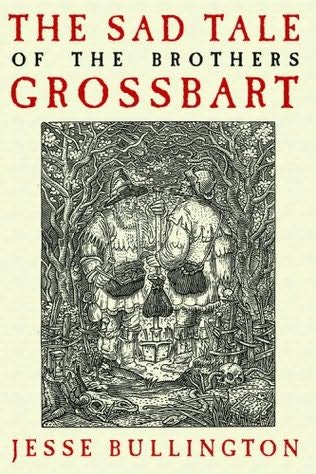

Let me first say that this novel is one of the greatest books I have ever picked up. It completely blew me away, and I mean it completely blew me away, with its entirety. Set in 1364 a set of twin brothers, Manfried and Hegel Grossbart, are the embodiment of all that is less than desirable in humanity. To begin with, their means of livelihood is thievery: to be more precise, they are grave robbers. They ply their trade well, not looking to hurt those who let them get on with their business. They are the physical embodiment - do not think of the brothers as two separate beings, though they are - of the most grandiose self delusion I have ever read. They thieve, they murder, they are unbelievably coarse of tongue, and they ruin not only lives of good and honest people but also leave behind a legacy more pestilent than that of the plague which has newly emerged in Europe. To cap it all they possess abilities which aid them in their nefarious roaming's of Germany. Then one night after murdering the family of a local farmer, revenge for catching the brothers stealing the farmer's crops and the subsequent beating of them, the brothers flee for their lives. Their journey to Gyptland in search of treasure has been expedited as a posse of men seek to bring the brothers to justice. Let me get this through to all reading this ... this is not an easy novel to focus ones mind upon. The sociopathic nature of the brothers is gruesome, you have been warned.
But here is the kicker; this novel is funny, darkly funny. The brothers see what they do as totally acceptable. This theme of self-righteousness that exudes from the brothers deformed bodies and minds is simply a wonder in storytelling. Their avarice only exceeds their callous disregard for life, but not for the afterlife - the brothers see themselves somehow connected to Mary, mother of Jesus, and that they work through her. Religious discussion and philosophical musings delightfully pepper this novel as the brothers seek enlightenment through an endearingly sadistic one-on-one battle of wits. The intimate knowledge (knowledge they wrongly believe they possess) gives them this smug, self-satisfied, and hateful air - the more you read the more you begin to loathe the duo.
As Manfried and Hegel seek their treasure in foreign climates they begin to suffer in some most unusual ways. Here is where the author balances a tapestry of ironic punishments worthy of those mortal men suffered when they earned the ire of the Greek gods. I won't reveal what they are, but they are viciously delivered and such sufferings are justly hoisted onto the pair. However, both brothers prove to be near impossible to catch and ever more difficult to kill. The bawdy gruesomeness of who they are and what they do creates this stench of near invincibility that those they encounter respectfully acknowledge. To cap it all, demons and men alike seek retribution on the brothers as they cut a path south through the Alps to Venice and then to Egypt. I simply loved reading this novel, and I regret that it is now finished.
This novel is a compulsory purchase.

| Authors | Awards | Blogs |
| Fanzines | Index | Magazines |
| Publishers | Retailers | Reviews |